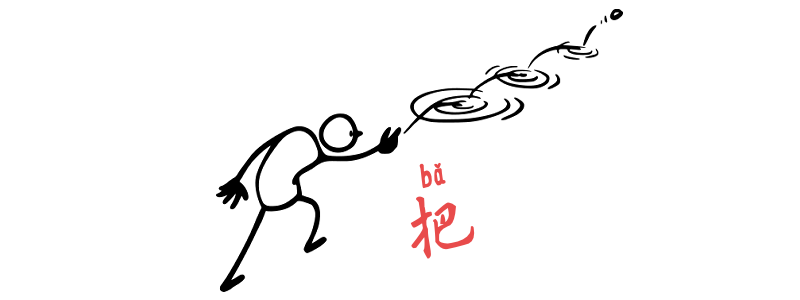Grammar Point:
There are 3 functions of 把 bǎ in Chinese. Determination, command, and doing a movement on something that makes a change to it.
If you’re not familiar with the basic foundation of 把 structure, I suggest reading the following articles first.
- 把 bǎ Part 1 (HSK 3)
- 把 bǎ Part 2 (HSK 4)
- 把 bǎ Part 3 (HSK 5)
- 把 bǎ Part 4 (HSK 6)
Structure
(S) + 把 + O + Verb + 了
This structure may seem similar to the 把 structure at the B1 level, but it actually implies actions that result in harm, impairment, or trouble. It is always used in a negative context with a negative verb.
去年他父母去世了,沒想到後來把太太也跑了去年他父母去世了,没想到后来把太太也跑了
Last year his parents died, but he didn’t expect his wife also left him later.
錢沒賺到,卻把命賠了钱没挣着,却把命赔了
Money is not earned, but the life is lost.
想投資卻不好好做準備,小心把老本給丟了想投资却不好好做准备,小心把老本给丢了
If you want to invest without proper preparation, you will lose your capital.
Different Usages
手把手教 shǒubǎshǒu jiāo
This term “手把手教 shǒubǎshǒu jiāo” means to provide hands-on, step-by-step instructions, often used in beginner courses such as cooking, painting, setting up a website, or creating a YouTube channel. The phrase emphasizes the personal guidance and attention given to each individual to ensure their success in learning a new skill.
想當網紅卻不知道怎麼開始嗎?訂閱我,讓我手把手教你怎麼從0粉絲到10000粉想当网红却不知道怎么开始吗?订阅我,让我手把手教你怎么从0粉丝到10000粉
You want to be an influencer but don’t know how to start? Subscribe me! I will teach you how to go from 0 followers to 10,000 followers.
你如果有不會寫的中文字可以看這個影片,它手把手地教妳怎麼寫每一個字你如果有不会写的中文字可以看这个视频,它手把手地教妳怎么写每一个字
You can watch this video if you don’t know how to write Chinese, it teaches you how to write every word by hand.
(别 or 不) + 把 + O + 当(一)回事
当回事 dāng huíshì is mostly used in spoken Chinese. It means to take something seriously or to hold something in high regard.
你到底有沒有把我當回事你到底有没有把我当回事
Do you take me seriously or not?
你別不把咳嗽當回事,小症狀也可能是大病你别不把咳嗽当回事,小症状也可能是大病
You should take your cough seriously, small symptoms can be a terrible disease.
他從不把我說的話當一回事他从不把我说的话当一回事
He never takes what I say seriously.
S + 把 + 我 + 当 + 空气 or 塑胶
Both air (空气 kōngqì) and plastic (塑料 sùliào) play important roles in the world, but they are often overlooked. This phrase is commonly used by the younger generation as a way to express the sentiment of ‘you should take me seriously or show me some respect.’ It is typically used as a rhetorical question.
你們是不是該問問我的意見,你把我當塑膠啊?你们是不是该问问我的意见,你把我当塑料啊?
Shouldn’t you ask my opinion? Are you treating me like plastic?
我還在這裡吃飯你們就開始接吻,把我當空氣啊?我还在这里吃饭你们就开始接吻,把我当空气啊?
I’m still eating here and you start kissing. Do you think I am air?


